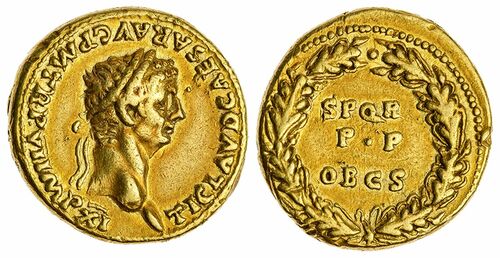
Auction: 23007 - Ancient Coins Including the 'Kyrios' Collection of Greek Coins and featuring the 'Ostorius' Collection of Roman Gold
Lot: 187
The 'Ostorius' Collection | NGC Choice VF | Roman Empire, Claudius (41-54), AV Aureus, AD 46-47, Lugdunum,
The reverse of this coin utilises a motif first seen on the coinage of Augustus, proudly displaying the hereditary honour of the corona civica first conferred upon that emperor, ob cives servatos - 'for having saved the citizens'.
Eckhel observes that this reverse was 'frequently revived by succeeding Caesars, not often careful about whether such praise could truly be bestowed upon them'. Stevenson (DRC) is scathing about Claudius' use of the type, remarking 'as if that most indolent and apathetic, if not most stupid, of Emperors ever did an heroic or humane action to merit the eulogy'. Not alone in his hostile view of Claudius, Seneca in his Apocolocyntosis writes that Claudius' voice belonged to no land animal, and that Hercules himself was a good deal disturbed at the sight of him, fearing a thirteenth labour was upon him.
Despite the disdain of the Imperial family, it seems that from very early on the general populace respected Claudius. At Augustus' death, the equites chose Claudius to head their delegation. When his house burned down, the Senate demanded it be rebuilt at public expense. They also requested that Claudius be allowed to debate in the Senate.
After the assassination of Caligula, Claudius was brought to the principate having had no preparation for the imperial role. His physical ailments had meant that he was not seen as a threat by potential enemies throughout the reigns of Tiberius and Caligula. Despite a lack of administrative experience Claudius did prove an able and efficient emperor, who improved upon Rome's infrastructure of roads, aqueducts and canals and increased the size of the empire. During his reign, Thrace, Lycia and Judaea were all annexed as Roman provinces, and the conquest of Britain was begun. Claudius' reign also is also notable for the centralisation and formalisation of imperial bureaucracy.
Though portrayed by several ancient historians as lowbrow, bloodthirsty and cruel, quick to anger and too easily manipulated, Claudius' works present a very different view, painting a picture of an intelligent, scholarly, well-read, and conscientious administrator with an eye to detail and justice. Since the discovery of his 'Letter to the Alexandrians', much work has been done to rehabilitate Claudius' reputation.
Besides his history of Augustus' reign, his major works were a twenty-volume history of the Etruscans and an eight-volume history of Carthage. Claudius is also noteworthy as being the last person known to have been able to read Etruscan. Though lamentably none of his works have survived, many were used by Pliny the Elder in the writing of his Natural History.
Subject to 20% VAT on Buyer’s Premium. For more information please view Terms and Conditions for Buyers.
Sold for
£8,000
Starting price
£8000




